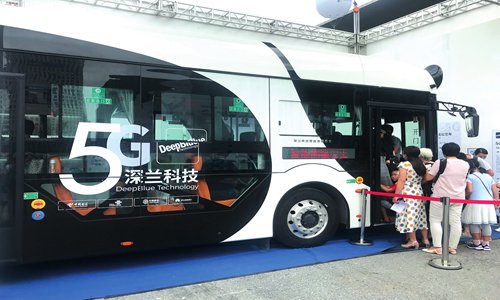HOME >> BUSINESS
China's autonomous driving gets boost from 5G
By Huang Ge Source:Global Times Published: 2019/9/23 21:43:41
Related shares rise after release of China’s first commercial licenses

Visitors line up to look at the interior of a self-driving bus by DeepBlue Technology (Shanghai) Co at the World Artificial Intelligence Conference 2019 in August. Photo: Xie Jun/GT
China's autonomous driving sector will enter the fast lane to maturity with the comprehensive application of advanced technologies such as artificial intelligence and 5G, and will play an increasingly leading role in the global industry, analysts said on Monday.Chinese shares related to autonomous driving got a boost on Monday after Wuhan, capital of Central China's Hubei Province, issued the country's first commercial licenses to three companies over the weekend.
Zhejiang-based Soyea Technology Co, Harbin Viti Electronics Corp and Jiangsu-based Duolun Technology surged by the daily limit of 10 percent. Zhejiang Shibao Co increased 5.16 percent and Shenzhen-based Road Rover rose 2.9 percent.
On Sunday, Baidu Inc, Haylion Technologies and DeepBlue Technology (Shanghai) Co received licenses from the Wuhan traffic authority and will conduct trials in designated areas, according to the Xinhua News Agency.
Unlike road test licenses, these licenses will enable intelligent-connected cars to carry passengers publicly, Zhao Xu, vice president for technology at DeepBlue, was quoted as saying in a press release received by the Global Times on Monday.
Obtaining the license means having ordinary (standard) bus operation qualifications, which provide policy support for the commercial operation of intelligent-connected vehicles and signal that the development of smart cars in China has begun to enter the commercial era, according to Zhao.
China's technology and network development are ready for the growth of the autonomous driving industry and have reached world-class levels, Su Hui, an analyst with the China Automobile Dealers Association, told the Global Times on Monday.
But there are still many challenges such as a lack of qualified facilities across the country, Su said.
Only a limited number of qualified roads have been open for test drives in recent years and there is still a long way to go for the popularization of autonomous driving in the country, Su said, noting that more efforts are needed to apply networks to serve road conditions suitable for the industry's development.
Although the domestic industry lags behind that of the US, analysts are optimistic about its growth prospects.
China's 5G technology, large investment in infrastructure and support from the central and local governments will power the development of the Chinese self-driving sector, Feng Shiming, a veteran car industry analyst based in Shanghai, told the Global Times on Monday.
Although China's self-driving industry started later than that of the US, which is the most advanced in the world, it has large growth potential. Feng said that the US industry has an advantage over the Chinese sector in terms of the cumulative distance traveled.
But China's accumulation of big data and technology experience under complex domestic traffic conditions is also valuable, analysts said.
China has attached increased importance to the development of the autonomous driving industry. On Thursday, the State Council, the country's cabinet, released plans to encourage research and development of smart-connected vehicles and build an independent, controllable and complete industry chain.
Transport authorities across the country have awarded road test licenses for autonomous driving in 16 cities such as Beijing, North China's Tianjin Municipality and Changsha, capital of Central China's Hunan Province, since March 2018, media reports said.
Baidu, one of the leading companies that boasts self-driving technology based on its Apollo platform, has received more than 100 road test licenses. In June, it won 45 autonomous road test licenses for Changsha.
Baidu said it had no details to reveal when reached by the Global Times on Monday.
Newspaper headline: Autonomous driving gets boost from 5G
Posted in: INDUSTRIES,COMPANIES